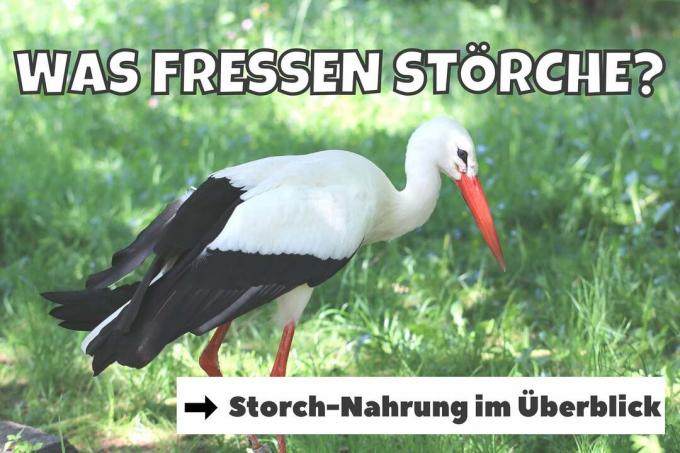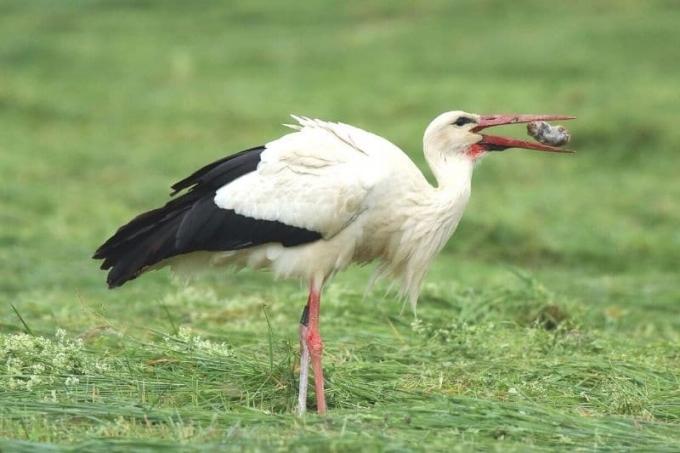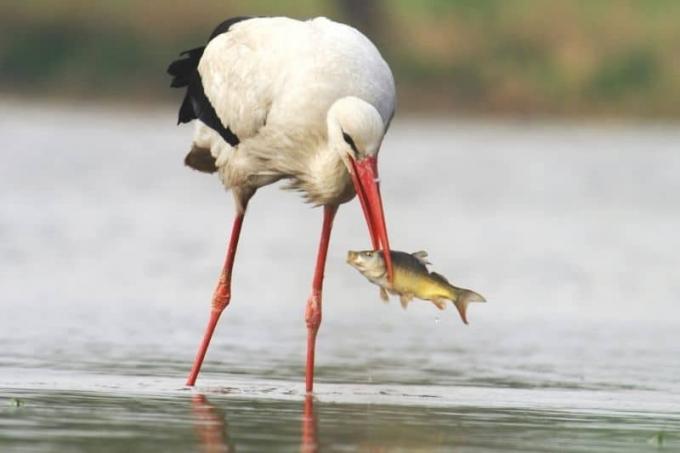
contents
- This is how storks feed
- hunting behavior
- small mammals
- amphibians and reptiles
- fish
- insects and other small animals
- frequently asked Questions
The white stork (Ciconia ciconia) is one of the native migratory birds. It is commonly found in open landscapes and wetlands. There he looks for food. This article explains what storks particularly like to eat.
In a nutshell
- Storks only eat meat
- hunt in open areas
- diverse range of foods
- Young animals require more food and smaller feed animals
This is how storks feed
The stork is one diurnal carnivore, He despises plants completely. But its food spectrum is very broad. It eats both small and large animals of many different species. Since he has no teeth to chew, he swallows his prey whole. From this it can be concluded that young storks can eat much smaller prey than adult birds. Parents that feed their young often pre-digest the food.

A notice: Feeding as many different animals as possible ensures better nutrition for the young birdsNutrient supply and thus healthier growth.
Because the stork is not specialized for any particular prey, its diet often depends on what animal species are found in its environment. For example, white storks in the zoo are almost exclusively fed with day-old chicks.
hunting behavior
are storks near bodies of water, in meadows, fields and pastures in search of food. Their hunting ground is several square kilometers, although they generally stray less far from their eyrie in bad weather. During the hunt, they stride across the area looking for food. As soon as they have spotted an animal, they slowly sneak up and capture it with a well-aimed beak. The same applies when they are in the water foraging for food.
A notice: Adult storks need about half a kilo of food per day. Young animals need more than twice as much to grow up healthy.
small mammals
In meadows and fields, the stork usually finds many small mammals, especially rodents of all kinds. Among them are:
- wood mice
- field mice
- voles
- rats

Next to the mice themselves, sometimes small predators are also on the menu, which in turn hunt the rodents. This includes, for example weasel. Other small mammals hunted by the stork are moles, hamsters and young of larger mammal species. The bird does not stop at dead animals.
amphibians and reptiles
frogs, which are considered the main diet of white storks, make up only a small part of the diet. In addition, storks also eat toads, newts, lizards and small snakes. The respective young animals are not safe from the stork either. He even loots tadpoles in the water, which may seem small for its size, but are well suited to the young. He can filter them straight out of the water with his beak.
fish

Similar to herons, the stork can stand motionless in the water and watch out for fish swimming by. He then devours it whole. Storks also eat other aquatic animals, such as insects and their larvae. However, since the stork is not a swimming bird, it hunts only in shallow water on the shore.
insects and other small animals
It seems strange that white storks hunt such small animals as insects, but in fact they are one of the main food sources. Although this applies in particular to the young animals, the adult storks also eat a large number of small animals. In the winter quarters in Africa, for example, these are mainly the bigger grasshoppers. Insects and worms are often easier to catch than larger animals.
frequently asked Questions
In Germany there are white and black storks (Ciconia nigra). While the white stork also likes to be close to people, the black stork prefers to nest in secluded forest areas.
No, storks look for their own food and that of their young animals. If you find an injured stork, you should not try to nurse it back to health on your own. The animal belongs in the hands of a competent person. Information on this is available from veterinarians, animal shelters or wildlife sanctuaries.
Since there are enough breeding pairs, native storks are not considered endangered. However, habitat and nesting destruction is still a problem. White storks sometimes have to search for a very long time before they find something to eat.



